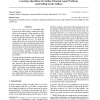Free Online Productivity Tools
i2Speak
i2Symbol
i2OCR
iTex2Img
iWeb2Print
iWeb2Shot
i2Type
iPdf2Split
iPdf2Merge
i2Bopomofo
i2Arabic
i2Style
i2Image
i2PDF
iLatex2Rtf
Sci2ools
ICML
2006
IEEE
2006
IEEE
Learning algorithms for online principal-agent problems (and selling goods online)
In a principal-agent problem, a principal seeks to motivate an agent to take a certain action beneficial to the principal, while spending as little as possible on the reward. This is complicated by the fact that the principal does not know the agent's utility function (or type). We study the online setting where at each round, the principal encounters a new agent, and the principal sets the rewards anew. At the end of each round, the principal only finds out the action that the agent took, but not his type. The principal must learn how to set the rewards optimally. We show that this setting generalizes the setting of selling a digital good online. We study and experimentally compare three main approaches to this problem. First, we show how to apply a standard bandit algorithm to this setting. Second, for the case where the distribution of agent types is fixed (but unknown to the principal), we introduce a new gradient ascent algorithm. Third, for the case where the distribution o...
Related Content
| Added | 17 Nov 2009 |
| Updated | 17 Nov 2009 |
| Type | Conference |
| Year | 2006 |
| Where | ICML |
| Authors | Vincent Conitzer, Nikesh Garera |
Comments (0)

